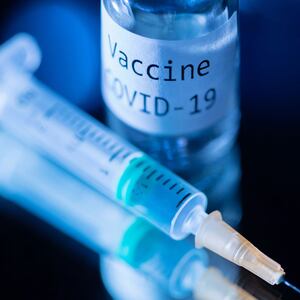The new variants from the United Kingdom, South Africa, and Brazil have arrived, and COVID-19 is about to get much worse in America. It may hit our Black communities the hardest—unless we devise a new plan to prevent a potentially catastrophic surge in deaths and protracted illnesses.
Last year, we quickly learned how Black populations suffered disproportionately compared to most other groups in the United States. Approximately 56,000 Black people have been recorded as losing their lives due to COVID-19, and the figure is likely an undercount. This number represents 16 percent of all documented COVID-19 deaths nationwide, exceeding the percentage of Black Americans in the U.S. population. One in every 792 Black Americans has died in connection with the coronavirus, about three times the rate among white people. Black people are also far more likely to contract COVID-19 or require hospitalization.
Equally disturbing, Black Americans, at least early on in the pandemic, appeared to be dying from COVID-19 at a younger age compared to the rest of the U.S. population. Whereas 13 percent of white deaths examined by the CDC were under the age of 65, 30 percent of nonwhite deaths fell in that age range.
The reasons for the high rates of serious illness and deaths at younger ages require more in-depth investigation. They likely include higher exposure rates due to the essential nature of work in low-income neighborhoods connected to construction sites or small businesses, and, possibly virus infections among homeless and incarcerated populations. There are also substantial rates of diabetes, hypertension, renal disease, and obesity among Black populations.
The bottom line is that we are losing thousands of Black moms, dads, brothers, and sisters in their forties, fifties, and early sixties to COVID-19. We are moving to a new reality in which, soon, most Black people may know someone personally who has lost their life to COVID-19.
Our best hope to prevent further devastation is through vaccination. But there, again, we are failing Black families.
Although vaccination data are still not widely available in many states, it already appears that Black Americans have fallen behind white ones. A new Kaiser Health News analysis in 16 states finds that white residents significantly outpace Black residents, often by a factor of two or three times, in terms of immunization rates. For example, in Mississippi—a state with a 38 percent Black population—only 18 percent of those who had been vaccinated were Black.
A major concern is lack of vaccine access. Under President Trump, our national vaccination program for COVID-19 relied significantly on hospital and pharmacy chains, even though many poor neighborhoods no longer sustain community hospitals or became “pharmacy deserts.” Hospital closures in segregated communities are well documented, and a 2014 study in the prestigious Health Affairs policy journal highlighted the desertification of pharmacies in segregated Chicago communities.
Compounding inadequate health care and pharmacy access are high rates of vaccine refusal or hesitancy. A recent study I took part in, published in Social Science & Medicine and led by Dr. Tim Callaghan at Texas A&M University, found that 31 percent of Americans did not plan on getting vaccinated against COVID-19—with Black people 40 percent more likely not to attempt immunization. Among the major reasons cited were fears about COVID-19 vaccine safety and efficacy, as well costs and lack of health insurance. An earlier Kaiser study had similar findings.
A perfect storm is brewing in Black communities across America. The increased COVID-19 exposure in low-income neighborhoods, high rates of co-morbidities and deaths in younger age groups, lack of vaccine access, and vaccine refusal, all work to ensure that adult Black people will sustain devastating losses.
And now we face the impact of emerging variants.
The variants have already gained a foothold in 32 U.S. states and could outcompete existing ones in the coming weeks. COVID-19 is about to become even more contagious, and possibly more lethal. By the spring, the new COVID-19 variants may cause historic decimation of Black communities.
Beyond the infrastructure issues required to improve health systems in low-income communities, we must take steps to rapidly immunize Black Americans ahead of the variants. The Biden administration has put forward a sound plan to achieve equity in communities of color—and to vaccinate the American people by the fall. But with the variants surging, we are running out of time, and must complete a national vaccination campaign by the summer. Avoiding a protracted path of destruction requires immediate expansion of vaccine access in Black communities.
We must also effectively communicate the dangers of COVID-19 to Black Americans, especially those in their middle-aged adult years who will otherwise succumb to the virus in large numbers. This includes addressing the horrific legacy of Tuskegee in the 20th century and reassuring the Black community that vaccination against COVID-19 is not a twisted experiment.
Our message: Vaccination offers the only certain path to avoid hospitalization, ICU admission, or death.
There is also another important element at play. In 2019, anti-vaxxer groups specifically targeted communities in Harlem, New York, with a disinformation campaign, much as they did the Minnesota Somali immigrant community in 2017 and New York Orthodox Jewish groups in 2018 and 2019. Vaccine hesitancy may represent a fallout from the Harlem anti-vaxxer rallies of 2019. In response, scientists and doctors must make efforts to reach Black audiences through radio programming, podcasts, and zoom calls.
We must counter the awful assertions of anti-vaxxer groups, and make this a national priority to prevent dramatic losses of life on an almost unimaginable scale.







